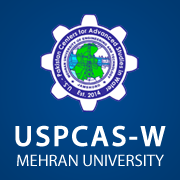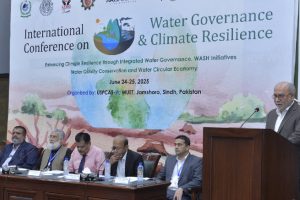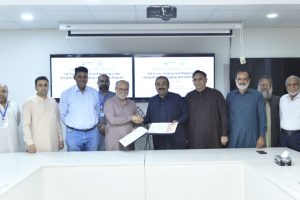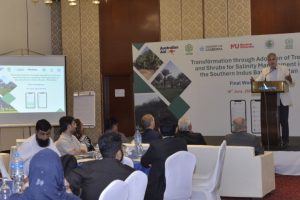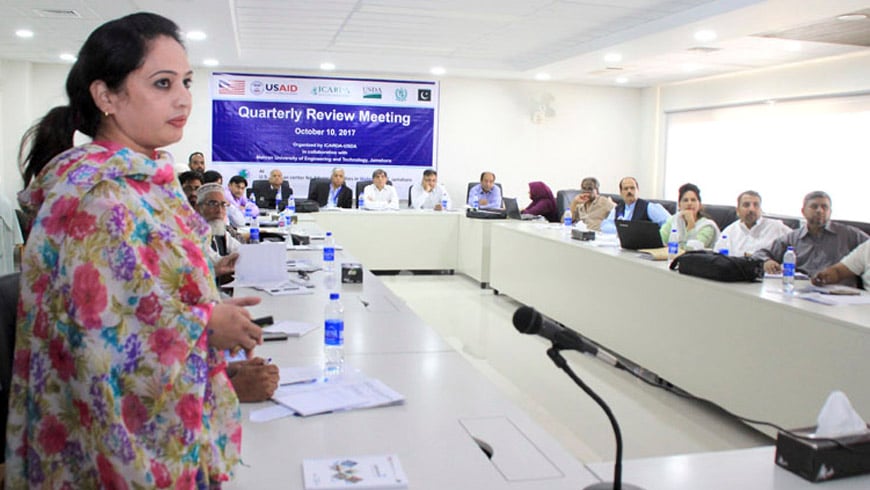
Quarterly Meeting of ICARDA-USDA Project Pakistan Water Dialogue: Diffusion & Adoption through Partnerships & Actions of the Best Watershed Rehabilitation & Irrigation Practices
Dr. Abdul Majid, Country Manager for Pakistan of International Center for Agricultural Research in the Dry Areas (ICARDA) said that efforts were being undertaken to strengthen Pakistan’s water productivity by using the best irrigation practices and modern technologies, this he said at the quarterly meeting on “Pakistan Water Dialogue: Diffusion and Adoption through Partnerships and Action of the Best Watershed Rehabilitation and Irrigation Practices”, second phase project funded by United States Department of Agriculture (USDA) and ICARDA, held in the Conference Meeting Hall of U.S.-Pakistan Center for Advanced Studies in Water (USPCAS-W) at Mehran University of Engineering and Technology (MUET) on Tuesday.
Dr. Majid said that this project aimed to build the capacity of rural farmers and to facilitate the adoption of modern cost-effective and efficient irrigation practices and technologies, particularly drip, sprinkler, raised-bed planting and pipe irrigation systems. He said that thirteen different technologies are being used on the water component of the project in this phase whereas the effective work is also being carried out on the soil component of the project. He further said the by the adoption of the modern irrigation methods and soil testing, not only the water could be saved but also productivity will be increased and also use of chemicals, fertilizers and pesticides will be reduced.
Dr. Bakhshal Lashari, the project director USPCAS-W MUET said that role of Agriculture Service Providers (ASPs) is very much important and all the implementing partners of the project may include ASPs in the agenda and activities. He said the government and farmers are major stakeholders of the project so their efforts to get the project successful need to be highlighted. In the quarterly meeting of the project implementing partners included Prof. Dr. Abdul Latif Qureshi from USPCAS-W MUET, Mr. Mushtaq Ahmed Gill, South Asian Conservation Agriculture Network (SACAN) Lahore, Mr. Ahmad Zeeshan Bhatti, from Pakistan Council of Research in Water Resources (PCRWR) Islamabad, Dr. Riffat Bibi from Soil and Water Conservation Research Institute (SAWCRI) Chakwal, Ms. Marjan Aziz from Barani Agriculture Research Institute (BARI) Chakwal, Dr. Abid Hussain from Social Sciences Research Institute (SSRI) National Agricultural Research Centre (NARC), Dr. Muhammad Munir Ahmed from Climate Change Alternate Energy and Water Research Institute (CAEWRI) NARC, Dr. Allah Bakhsh from Water Management Research Centre (WMRC), University of Agriculture Faisalabad, Mr. Muhammad Yousuf Channa representative of Sindh Agriculture Extension Department, presented their progress report and future adoption plan of the project activities.
Project’s Background Information:
For six years now, USDA, with support from the United States Agency for International Development (USAID) has worked to improve watershed rehabilitation and irrigation by promoting practices and technologies that assist in water and soil conservation. USDA’s work began in 2011, in partnership with ICARDA, with a five-year program to help rural farmers. The project established over 40 demonstration sites, published 150,000 brochures, held 240 farmers’ field days and reached 14,000 farmers. Due to these efforts, more than 1,500 farmers have already adopted one or more of the promoted technologies. USDA also partnered with the International Water Management Institute (IWMI) from 2013-2015. This program brought together local officials and USDA technical experts to develop the Pakistan Water Dialogue Consensus Action Plan. In 2016, USDA and ICARDA began Phase II of the Pakistan Water Dialogue: Diffusion and Adoption through Partnerships and Action of the Best Watershed Rehabilitation and Irrigation Practices. This program builds upon management practices developed in the earlier Watershed program.

